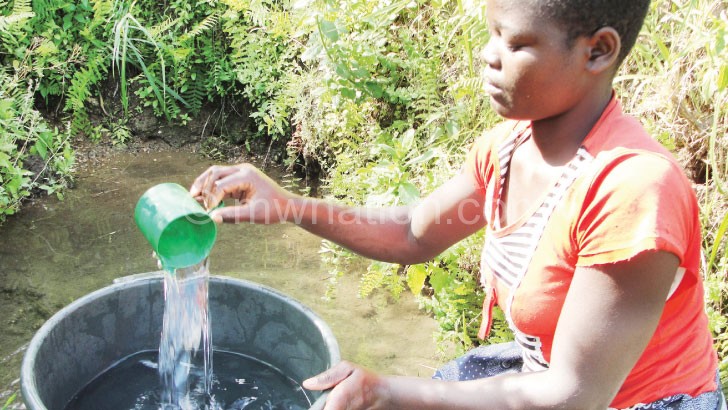Bringing justice to water access
Malawians face perennial water problems. As KONDWANI KAMIYALA finds out, policy and other commitments are not enough to improve the situation.
Water maybe life elsewhere, but apparently, not so among many in Malawi.
Stories abound of lack of the vital resource. A 26-year-old woman with disability, Mary Mhango, walks 12 kilometres to and from her home in Bangwe to Limbe to fetch water. On her way back, she has to balance the bucket on her head. When she gets back home, the bucket is half full.

In Nkhotakota, for seven years, people have had to drink unsafe water at Jalo-Kapeta, as the kiosk was shut down due to unpaid bills. An aspiring parliamentarian knew the people’s plight and it became the ace at the elections. When he got the parliamentary seat, the promise was never fulfilled.
Village head Mbuna of Traditional Authority (T/A) Kanyenda’s area in the district says the water has been discoloured by rust, making it yellowish.
The cries come from far and wide.
In Blantyre, Chilobwe Township residents claim they at times go for weeks with no single drop of water.
The water challenges have not spared schools. Pupils in T/A Chikho’s area in Ntchisi say they have had to skip classes in search of water.
Access to water, says Centre for Social Research (CSR) deputy director Blessings Chinsinga, is a right although that is not expressed in the Bill of Rights of the Constitution.
“We say water is life. The Constitution guarantees a right to life. Therefore, the absence of clean and safe water impinges on the people’s unalienable right to life,” says Chinsinga.
A 2006 United Nations Development Programme (UNDP) report showed 1.2 billion people in the world-almost a fifth of the world population-live in areas facing water scarcity.
In 2002, International Food Policy Research Institute (Ifpri) said over one billion people globally lack enough safe water to meet the minimum levels of health and income. As climate change continues to take its toll, the future looks bleak.
In 2007, the Food and Agriculture Organisation (FAO) projected that water demand would grow by 55 percent globally between 2000 and 2050. The Organisation for Economic Cooperation and Development (OECD) in 2012 predicted that by 2050, 240 million people especially in rural areas will be without an improved water source; and the Ifpri in 2002 predicted that due to water stresses, 4.8 billion people and half of global grain production will be at risk by 2050.
What is the Malawi situation?
Chinsinga, whose organisation is running a Scottish Government-funded ‘Water for All’ project, says the situation is dire.
“Government claims 84 percent of the population has safe water but our findings show that only about 30 to 50 percent have access to potable water. The urban informal sector is the most neglected,” he observes.
Currently run in Karonga, Salima and Nsanje, the three districts hardest-hit by climate change, the project seeks to build capacity at community and institutional level on effective water resource management and ensure climate justice for all.
Climate justice shows developing countries such as Malawi that benefited the least from the unsustainable pace of economic growth and capitalist expansion between 1950 and 2000 are facing a future of suffering.
“We are asking whether or not issues of human rights, social justice, equity and equality, vulnerability and climate change feature in water management approaches. We want to see if the existing methods and approaches are reaching the poorest, marginalised and most vulnerable communities,” says Chinsinga, adding that they will probe the gaps and how they can be filled.
CSR is working closely with the Tearfund, Eagles and Assemblies of God Care (AG Care). Tearfund is running the Enhancing Water Management in Rural Areas project.
AG Care executive director John Kanthungo says they engaged a constitutional law expert to ascertain if the right to water is guaranteed in the Constitution.
“It was found that despite Malawi’s recognition of the importance of water through policy and international law commitments, there is no explicit guarantee of the right to water in the Constitution or any domestic law. Although Malawi has undertaken specific obligations and enforces the right under international law, such obligations are not enforceable directly,” says Kanthungo. n





